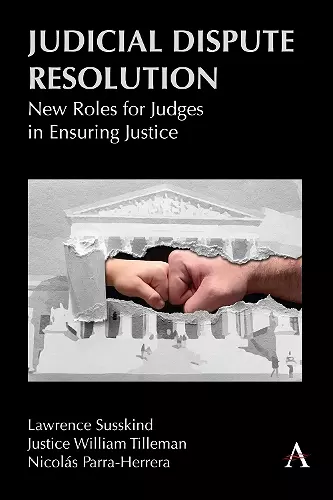Judicial Dispute Resolution
New Roles for Judges in Ensuring Justice
Lawrence Susskind author Justice William Tilleman author Nicolas Parra Herrera author
Format:Hardback
Publisher:Anthem Press
Published:16th May '23
Should be back in stock very soon
This hardback is available in another edition too:
- Paperback£23.99(9781839988981)

This book explores how judges utilize judicial dispute resolution (JDR) to promote problem-solving among litigants, offering insights from nine case studies and highlighting the distinctions between JDR and alternative dispute resolution methods.
Judicial Dispute Resolution explores how judges utilize judicial dispute resolution (JDR) to promote problem-solving among litigants, ultimately leading to fairer outcomes. JDR, akin to mediation or alternative dispute resolution (ADR), is distinctive in that it is conducted by a judge rather than a private mediator. This book sheds light on the under-discussed practice of JDR, particularly in Canada, where it has been in practice for several decades but has remained largely confidential.
The authors had the unique opportunity to access confidential records and engage with parties involved in nine illustrative JDR cases. Through these cases, the book reveals the practical applications of JDR, showcasing how judges facilitate dialogue and negotiation between disputing parties. This firsthand insight provides a rare glimpse into the effectiveness of JDR in resolving conflicts and achieving just results.
Additionally, the book includes a comprehensive Teaching Appendix that summarizes the JDR cases from various legal perspectives, emphasizing the distinctions between JDR and traditional ADR methods. By outlining the processes and outcomes of these cases, the authors aim to enhance understanding of JDR's role in the legal landscape. This work not only fills a gap in existing literature but also serves as a valuable resource for legal professionals and scholars interested in alternative dispute resolution mechanisms.
“A deeply thoughtful treatment of judicial dispute resolution. The authors are clear-eyed both about the potential benefits of these evolving processes and about their limitations. The book offers compelling case studies, curated to provide readers with a thorough understanding of an opportunity for modern judges in all legal systems.” — Michael Moffitt, Philip H. Knight Chair in Law, Faculty-in-Residence, Clark Honors College, University of Oregon.
“Judges sit at the apex of dispute resolution processes. When all else fails, one or more of the parties may seek a judicial resolution of their dispute. As the three authors point out, this is neither efficient (it comes far too late in the process) nor satisfactory (it promotes winners and losers and seldom “resolves” the dispute). There is a better way! Judicial dispute resolution or JDR. It imagines a far more creative role for judges and that in turn will often lead to better results for the parties. This, however, will require a different orientation and skill set from the parties, and a select group of judges who have both the desire and the aptitude to embrace the unique skills of judicial dispute resolution. This book offers important insights into how both might be achieved.” — D. Paul Emond, Professor Emeritus, Osgoode Hall Law School, Founding Director, Part time instructor, LLM in Dispute Resolution, York University.
“An interesting book at once useful for the experienced mediator as well as the aspiring novice, filled with insightful advice based on a wealth of experience. Creativity is the secret to successful mediation and the authors have heartedly contributed in that regard in their resourceful work. I recommend it to everyone engaged in the important field of ADR.” — The Honourable Warren K. Winkler, O.C., O. Ont., K.C., LL.D. (Hon.), former Chief Justice of Ontario.
"Judicial Dispute Resolution: New Roles for Judges in Ensuring Justice" describes the ways in which judges, using JDR (Judicial Dispute Resolution), have been facilitating problem-solving among litigants, and in the process, ensuring more just outcomes. [...] The three co-authors also have collaborated to provide a complete Teaching Appendix summarizing the JDR cases from the standpoint of a variety of legal specialties, while highlighting the differences between JDR and ADR. [...] This book is especially recommended for college and university Judicial Studies collections and supplemental Arbitration/Negotiation/Mediation law school curriculum studies lists —Midwest Review
ISBN: 9781839988660
Dimensions: 229mm x 153mm x 26mm
Weight: 454g
288 pages